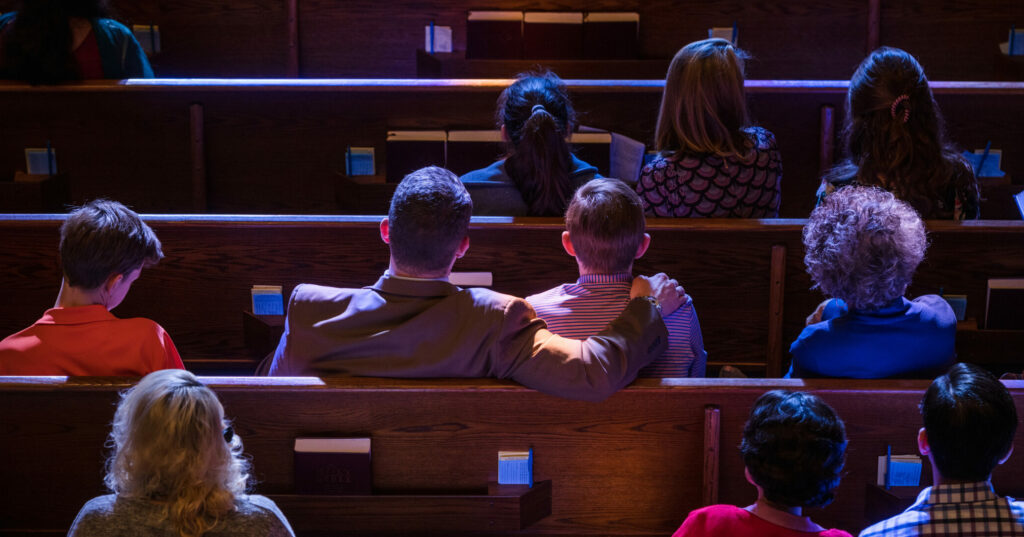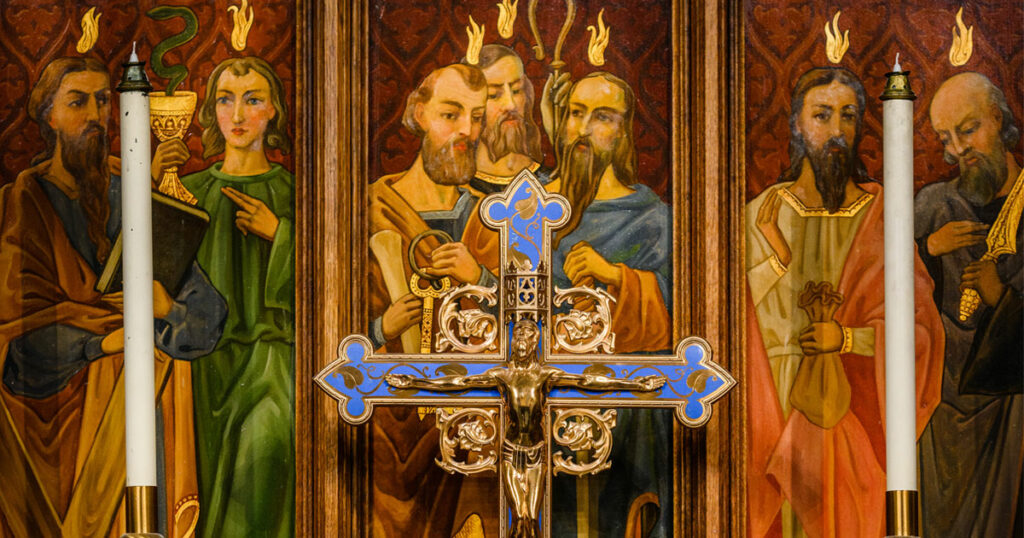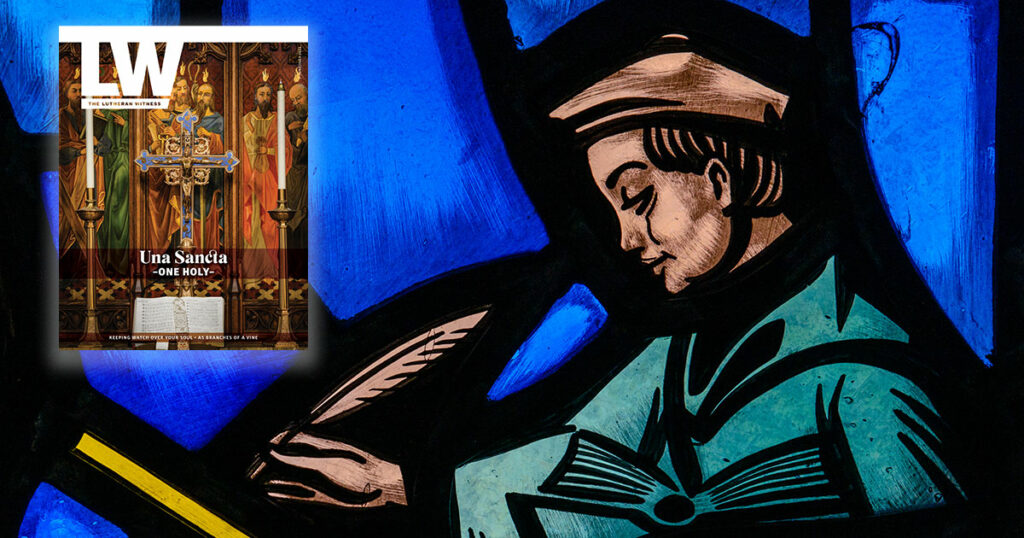By Jason D. Lane
Martin Luther gives a simple definition of the church: “Thank God, a seven-year-old child knows what the Church is, namely, the holy believers and lambs who hear the voice of their Shepherd. For the children pray, ‘I believe in one holy Christian Church’” (SA III XII 2–3). I believe. That does not mean I see or fully experience the one, holy Christian church. From an earthly perspective there does not appear to be much in which to believe. Divisions crept into the church during the days of the apostles, and theystill do today. These divisions within the church have been so harmful and pervasive that, at times, Christians have considered Jesus’ promise of one, holy Christian church as a nice idea but not a reality. A quick look at the list of worldwide Christian denominations seems to affirm this perspective. In other times, the church has been considered merely a human institution, a group of people who agree to stand and sit at roughly the same time on Sunday morning, rather than the Shepherd’s flock united by His Word.
In the relativistic malaise of our current age, even Christians can begin to believe that no one possesses a true and pure confession of God’s Word. The ancient confession — the ancient belief — that every Christian child learns from Baptism, “I believe in one holy Christian church,” has become regarded as a flight of fancy, as theoretically true but practically impossible. Against such a background, Luther’s definition of the church seems too simple or downright naïve. And yet, the doctrine of the church is an article of faith, established only by the Holy Scriptures.
The Shepherd’s voice
Christ, the Chief Shepherd, has called us out of the world and into His flock (1 Peter 5:2). Wherever one finds the living voice of Christ and those who by the Holy Spirit hear and believe it — both pastor and flock together — there is the church. Lutherans define the church as God’s giving and our receiving, that is, Lutherans confess that the church exists where the sinner is being forgiven in the stead and by the command of the Lord Jesus. Christ’s redeeming work and the delivery of that work through the preaching of the Gospel leave no doubt for the saints that there is a church or that they belong to it. Christ the Good Shepherd gives; His flock receives.
Defining the church as shepherd and sheep (John 10:1–18) denies any claim that a special group within the church is the true church, whether the papacy, the local congregation alone, the clergy alone or even one particular institutional church body, such as the LCMS. The shepherd and the sheep belong together, regardless of time and place in the world. That happens primarily in worship, whether here on earth or there in heaven. In the Church Triumphant in heaven, God and the Lamb gather the great multitude of saints adorned as a bride before her husband; the saints stand before the throne to receive from Him and to praise Him with joyful thanksgiving (Rev. 21:1–7). Even now, before the final day, the church is known on earth in worship, where God gives and His saints receive and give Him joyful thanks. Therefore, we deny that a group of Christians can be church without the office of preaching (AC V) and we deny that preachers can be church without faithful hearers (AC XXVIII). A congregation might be “vacant,” but she is never without the preaching office of Christ, even when there is no ordained man to fill it at the moment. The Lord’s promise that wherever two or three are gathered in His name, there He is among them (Matt. 18:20), makes clear that at least two are needed in the church: one for delivering and one for receiving the forgiveness offered in Jesus’ name.
The Lutheran Confessions beautifully set forth this doctrine of the church. The Augsburg Confession (AC) leads us in its first seven articles to confess the church most succinctly as a creation of the Triune God alone (AC I, Concerning God). God the Father has not despised fallen humanity who is by nature helplessly bound in sin (AC II, Original Sin), and therefore God has sent His Son into human flesh to rescue humanity by His death and resurrection (AC III, The Son of God). For the sake of His Son, God has declared His children righteous through faith without any work on their part (AC IV, Justification). But since no one can believe — without being told of it — that he is justified for Christ’s sake, “so that we may obtain this faith, the ministry of teaching the Gospel and administering the Sacraments was instituted. Through the Word and Sacraments, as through instruments, the Holy Spirit is given. He works faith, when and where it pleases God, in those who hear the good news that God justifies those who believe that they are received into grace for Christ’s sake” (AC V, The Ministry). Having received the Spirit and faith through the Word and Sacraments, the saints of God are led by the Spirit into every good work, just as good fruits spring from a good tree (AC VI, New Obedience). And so God creates out of this world’s fallen race His church, that is, “the congregation of saints in which the Gospel is purely taught and the Sacraments are correctly administered” (AC VII, The Church).
God has in all times and places gathered His church by the voice of Christ through the voice of His preachers, from Adam to Abraham, from Moses to Christ and His apostles and those whom He still sends today. Therefore, the church cannot be merely a human institution with human ceremonies, no matter how pious those ceremonies may appear. The church is from start to finish created and sustained by Christ with His Word and Spirit. This means the church is not simply an ideal to strive for, but the real embodiment of St. Paul’s words, “one body and one Spirit … one Lord, one faith, one baptism, one God and Father of all” (Eph. 4:4–6).
Something worth confessing
Against our current relativistic doubt, our Lutheran Confessions state: “We do say that this Church exists: truly believing and righteous people scattered throughout the whole world. We add the marks: the pure teaching of the Gospel and the Sacraments” (Ap VII and VIII 20). In other words, the true church with true saints can be found in the world, namely, where we find the voice of Christ with His gifts of forgiveness given and received, and the saints of God abiding in love with one another, wherever and whenever that may happen. Unlike the cynic who doubts that there is a true church or that the truth of God can be known or that anyone truly possesses the pure Christian confession, Lutherans boldly confess the one, holy Christian church. They do not compromise or lower the doctrinal standards of Holy Scripture to bring about some kind of man-made unity.
Nor do Lutherans seek a united church by retreating into smaller and “purer” communities because they are frustrated by compromises or by half-hearted commitment to the church’s orthodox doctrine and practice. The Lutheran Confessions teach that as long as the church does not overthrow the foundation of Christ (1 Cor. 3:11–12), the useless opinions that may at times be added to that foundation can be forgiven and corrected. As long as the foundation of Christ’s forgiveness remains and Christ’s voice can be heard and is believed, the church remains, even if in apparent weakness (Ap VII 21).
Lutherans also do not confess a unity of faith achieved by might, as Luther accused the Roman Catholic Church. He writes, “We do not agree with them that they are the Church. They are not the Church. Nor will we listen to those things that, under the name of the Church, they command or forbid. Thank God, a seven-year-old child knows what the Church is” (SA III XII 1). Luther was not suggesting that there were no Christians in the Roman Catholic Church of his day, but rather that the hierarchy of the church had taught many errors that nullified the proclamation of the forgiveness of sins for Christ’s sake. The papacy had overthrown the foundation of the church, and intentionally tried to silence the voice of Christ in the church, even if they had not done so entirely. In this sense, Luther argued that the papacy of Rome was not church since it did not offer Christ’s life-giving Gospel and wanted to be the church as “the supreme outward monarchy of the whole world” (Ap VII 23). Insofar as the Gospel was preached in the Roman Catholic Church and received by the saints in faith, the church could be found even there.
I believe in … the church
And the church is still here. Jesus still calls His sheep, and the sheep hear His voice, believe the Gospel and walk in love. The holy church exists wherever sinners gather at the font and are sealed with God’s name in Holy Baptism, wherever a called servant of Christ announces the grace of God to sinners in Christ’s stead, and wherever sinners gather in repentant joy at the altar of Christ to receive His body and blood for the forgiveness of sins and eternal life. In this Christian church, the saints believe the same Gospel and have the same Christ and the same Holy Spirit (Ap VII 10).
If faith is the substance of things hoped for and the confident assurance of things not seen (Heb. 11:1), then to believe in the holy church means to do so by faith and not by sight (2 Cor. 5:7). The doctrine of the church is an article of faith. It cannot be established according to human reason, human invention or human works, but according to Holy Scripture alone. Our confidence to confess the church as one is due to our confidence in Christ whose voice alone unites His church, both those who are near and those who are far off (Eph. 2:11–22). Or as He says, “I have other sheep that are not of this fold. I must bring them also, and they will listen to my voice. So there will be one flock, one shepherd” (John 10:16). Our Lord’s words do not speak of the church as a lofty idea or a dream, but as a promise fulfilled here in this life, where the Word is preached and the Sacraments administered according to Christ’s command (AC VII).
This article originally appeared in the June/July 2021 issue of The Lutheran Witness.







I agree with both Paul and Marcia. Matthew 18:20 does not say that “where two or more are gathered” one is for delivering and one for receiving forgiveness. Matthew 18:20 does not stipulate that a preacher be present. Matthew 18:20 does say that Jesus will be there. If Jesus promises that he will be there, how can Lutheran’s deny that this might be called a church? Who gave you that power to make that decision of others? I am Lutheran. In the last days, when we are all called to judgement, I want God to have seen my worship of Him, my faith given to me by the Holy Spirit and belief in Jesus Christ. Even if I am a church of one.
Just to much criticism of other denominations. Always. We are so elite.
The Holy Spirit is there. And everywhere. When we pray. When we sing hymns. And in Christian Fellowship. We need to acknowledge Him more. He will lead new members to our churches.
I find this teaching and understanding of The Holy Christian Church lacking among members of our LCMS. Jesus said, suffer the little children unto me, for of such is the Kingdom of God.
“The Lord knows those who are his.” (2 Tim. 2:19 ESV)